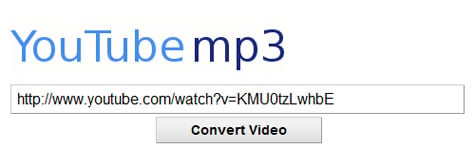TorrentFreak Email Update |
- Google Threatens To Sue Huge YouTube MP3 Conversion Site
- MPAA / RIAA Ponder Suing Persistent BitTorrent Pirates
- Kids To Get 3 Strikes and Copyright Education In Paris
| Google Threatens To Sue Huge YouTube MP3 Conversion Site Posted: 19 Jun 2012 04:36 AM PDT
This API, as it’s better known, provides web developers with access to certain YouTube features, but like many free gifts it comes with certain strings attached, aka the YouTube Terms of Service (ToS). One of the countless resources to use the YouTube API is YouTube-MP3.org, a huge site which according to Google’s DoubleClick service pulls in 1.3 million visitors every day. What YouTube-MP3 does is straightforward. At one end a user feeds the site with a YouTube URL and after a couple of minutes the site spits out a standalone MP3 file, perfect for ripping the audio from pop videos.  Needless to say these sites are hugely popular, particularly with the younger generation. Just last month TorrentFreak spoke informally with a small youth group about their current music consumption habits and without exception they were all using some kind of YouTube conversion service and listening to that music on their cellphones. Google, however, are not impressed with the activities of YouTube-MP3. In a letter dated June 8 sent to the site owner ‘Philip’ and shared with TorrentFreak, Associate Product Counsel at YouTube Harris Cohen makes the company’s position clear. Citing the ToS for YouTube’s API, Cohen insists that offering any kind of service that allows YouTube content to be downloaded (as opposed to simply streamed) is prohibited. Furthermore, Cohen underlines the fact that to "separate, isolate, or modify the audio or video components of any YouTube audiovisual content made available through the YouTube API” is forbidden, as is externally storing copies of YouTube content. Continuing to violate these restrictions, Cohen warns, may result in “legal consequences” for YouTube-mp3. The site has been given seven days to comply. Speaking with TorrentFreak, Philip told us that he sent a long response to Cohen providing him with details on YouTube-MP3, how the site services tens of millions of users, and asking for a call with YouTube to discuss the matter further. YouTube, however, doesn’t appear to be in the mood for negotiation. Google has just blocked all of YouTube-MP3′s servers from accessing YouTube so currently the site has no MP3 download service to offer or indeed withdraw. “We would estimate that there are roughly 200 million people across the world that make use of services like ours and Google doesn’t just ignore all those people, they are about to criminalize them. With the way they are interpreting and creating their ToS every one of those 200 million users is threatened to be sued by Google,” Philip adds. Not surprisingly Google sees things from a different perspective. It says that part of its responsibility to people uploading content to YouTube is to give them tools to manage how their content is shared, monetized and generally displayed. Some of those content owners, including the major record labels, frown on their music videos being used as a source for unauthorized MP3s, so they will welcome YouTube’s approach. Whether they prompted the action in the first instance is unknown. Whatever the outcome in the case of YouTube-MP3, Google has a big task ahead if it is to end all similar services online. A simple search for “YouTube MP3″ with its own engine produces dozens of alternatives. Just last year the world’s largest record labels sued another YouTube downloader site but getting Google to do the work at its root is probably much less costly. Source: Google Threatens To Sue Huge YouTube MP3 Conversion Site |
| MPAA / RIAA Ponder Suing Persistent BitTorrent Pirates Posted: 18 Jun 2012 10:30 AM PDT
The parties agreed on a system through which copyright infringers are warned that their behavior is unacceptable. After six warnings ISPs may then take a variety of repressive measures, which include slowing down offenders' connections and temporary disconnections. While all parties are keen to stress that the system is set up to educate, and that the privacy of Internet subscribers is guarded, there is some worrying language in the agreement that has been overlooked thus far. As part of the deal, ISPs have agreed to share progress reports. These reports include a variety of statistics, including the number of warnings that are sent out, and how many frequent offenders there are. Nothing out of the ordinary thus far, but that changes when we read the following sentence: “The Content Owner Representatives [MPAA / RIAA] or any other member of the Participating Content Owners Group may use such reports or data as the basis for seeking a Subscriber's identity through a subpoena or order or other lawful process. For the avoidance of doubt, the Parties agree that the Content Owner Representatives may share such reports with the other members of the Participating Content Owners Group..” In other words, the MPAA, RIAA and all of its members may use these progress reports to take their own actions against persistent BitTorrent pirates. This sheds an entirely different light on the educational “six-strikes” scheme. Repeat infringers are not just at risk of having their connections throttled, they can also find themselves dragged to court by the MPAA or RIAA. So much for safeguarding the privacy of subscribers. The potential legal action is cited again later in the agreement when it discusses what happens after users receive their sixth warning. “The Participating ISP will, however, continue to track and report the number of ISP Notices the Participating ISP receives for that Subscriber's account, so that information is available to a Content Owner Representative if it elects to initiate a copyright infringement action against that Subscriber.” This “action” the document refers to is legal action. Interestingly, if we look at an early draft of the agreement that was made public through a FOIA request, the term legal action is used. Presumably, this was changed to prevent any alarm bells from going off. Legal action
While the above is no certainty that the MPAA and RIAA will sue BitTorrent users, they wouldn’t have put the language above in the agreement if it’s not being considered. This is worrying, much more so than the “six strikes” warning system itself. Time will tell why the RIAA and MPAA put in this option to sue, and how they are going to capitalize on it. Source: MPAA / RIAA Ponder Suing Persistent BitTorrent Pirates |
| Kids To Get 3 Strikes and Copyright Education In Paris Posted: 18 Jun 2012 06:05 AM PDT
It has periodically released stats on who is getting warned and the results of those efforts, and has reported on issues including the effects and aftermath of the Megaupload shutdown. Of course, getting the message out about what the agency does (and how to avoid being targeted by it) is all part of Hadopi’s effort to reduce online piracy in France. For those who have engaged in file-sharing for many years, circumvention of Hadopi’s efforts may well be the number one priority. However, rightsholders will be hoping that the attitudes of the next generation of potential file-sharers will be different. According to an email obtained by French news outlet Numerama, Hadopi intends to play a part in shaping those future perceptions of copyright infringement at the earliest available opportunity. The proposed location for this initiative is the Kidexpo exhibition in Paris. The event, which attracts kids aged between 4 to 14, is set to take place during October this year and Hadopi have today invited rightsholders to join them in participating.  “Hadopi plans to propose a stand dedicated to raising awareness of copyright in the creative arts and cultural content platforms on the internet, in partnership with professionals,” it said in the letter seen by Numerama. Hadopi is predicting that around 150,000 children will attend and is inviting rightsholders to “build common tools tailored to that audience and to promote legal offers.” It will be interesting to see how Hadopi intends to educate children on the complexities of copyright law, or whether it will even try. Since “3 strikes” is now embedded in French law there is a clear need for children to be aware of the mechanism, but whether that exercise should be carried out with the assistance of corporations with a vested interest is up for debate. In any event, Hadopi and the rightsholders will be hoping that little ‘Pierre’ pictured above wearing earphones will be listening to music purchased through official channels, unlike his father who is more accustomed to obtaining it by more ‘creative’ means. Source: Kids To Get 3 Strikes and Copyright Education In Paris |
| You are subscribed to email updates from TorrentFreak To stop receiving these emails, you may unsubscribe now. | Email delivery powered by Google |
| Google Inc., 20 West Kinzie, Chicago IL USA 60610 | |


 YouTube is without doubt the biggest free resource of videos and music available online today. It can be enjoyed on the site itself, embedded in any webpage, or accessed via YouTube’s Application Programming Interface.
YouTube is without doubt the biggest free resource of videos and music available online today. It can be enjoyed on the site itself, embedded in any webpage, or accessed via YouTube’s Application Programming Interface.



No comments:
Post a Comment